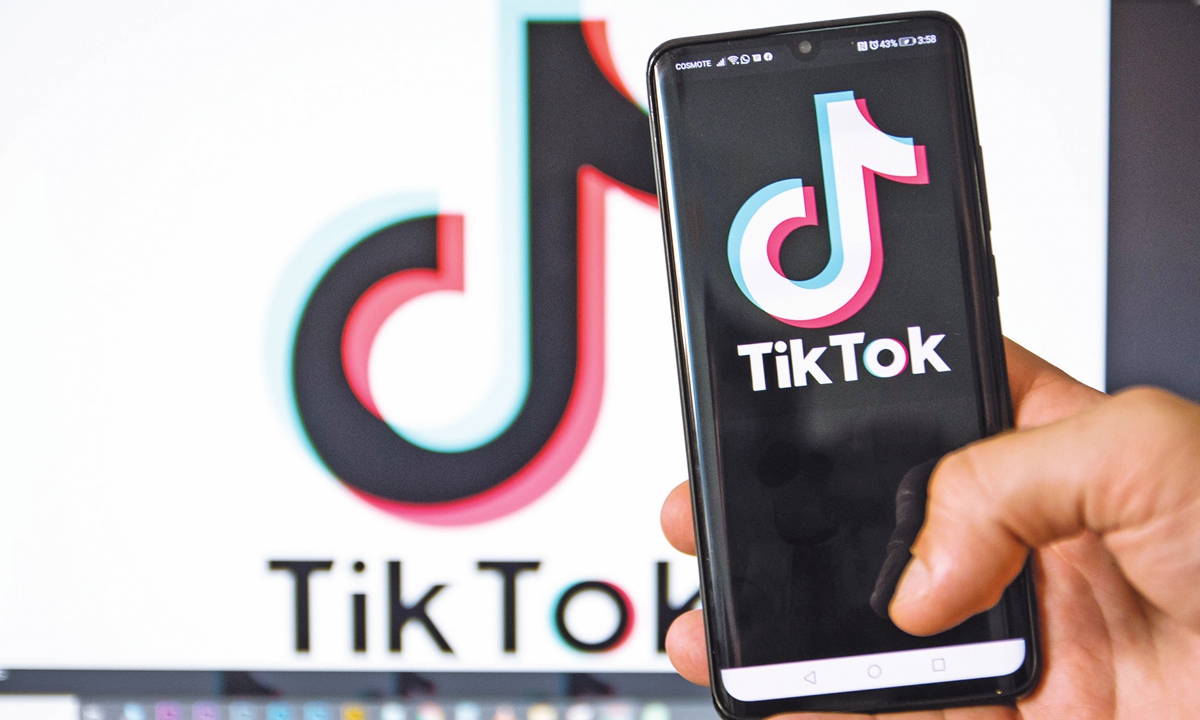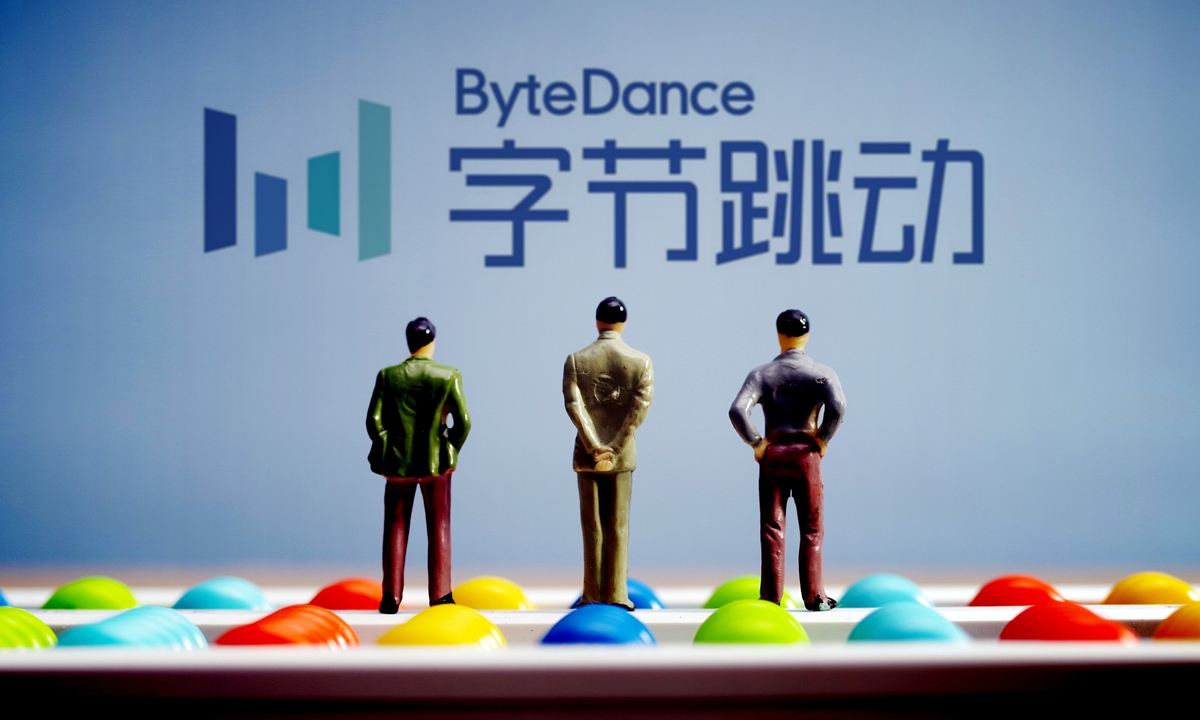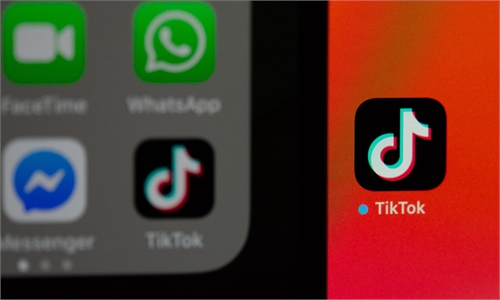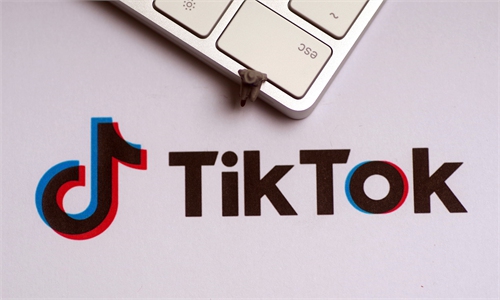ByteDance to sue US govt over TikTok ban on Monday
Legal action laudable, but outcome could be unpredictable: experts

TikTok closeup logo displayed on a phone screen, smartphone and keyboard Illustration: VCG
ByteDance, the parent company of short-video platform TikTok, confirmed on Sunday that it will file a lawsuit on Monday (US time) against the Trump administration over its executive order, in the first fight back by a Chinese corporation against US President Donald Trump's clampdown on Chinese social media amid an escalating tech war.
Chinese analysts said ByteDance's move is likely to be followed by other Chinese companies, notably Tencent, which has seen its interests harmed by a separate executive order signed by Trump.
"To ensure that the rule of law is not discarded and that our company and users are treated fairly, we have no choice but to challenge the executive order through the judicial system," the Beijing-based company confirmed with the Global Times on Sunday.
TikTok said it had tried to engage with the US administration for nearly a year, but it had faced "a lack of due process" and that the government paid no attention to facts.
"The US government has even tried to insert itself into negotiations between private businesses," the company said in a statement.
Chinese lawyers and legal experts said the lawsuit by ByteDance, coming as the US presidential election is nearing, will be closely watched by global media given TikTok's huge user base in the US, which is estimated at 100 million.
This is the second litigation announced against the Trump administration in a week.
A coalition of WeChat users in the US filed a law suit against the Trump administration on Friday, challenging its ban on the Chinese messaging app.
Separately, a TikTok employee lawsuit against the proposed ban, independent from the company's legal response, is being funded by a crowdfunding campaign.
On August 6, Trump issued an executive order banning any US transactions with ByteDance, set to take effect in 45 days. On August 14, Trump signed another executive order, asking ByteDance to divest its interests in US with a deadline of 90 days.
He Weiwen, a former senior trade official and an executive council member of the China Society for World Trade Organization Studies, said TikTok has the legal upper hand in defending its rights given by the First Amendment of the US Constitution that guarantees freedoms concerning religion, expression, assembly and the right to petition.
"TikTok has set a good example to other Chinese companies in standing up to the bullying of the Trump administration and checking its wantonness with legal means," He told the Global Times on Sunday.
"In the appeal that the company launched in a US federal court, the best outcome could include the federal court reversing Trump's executive order and halting any commercial negotiations concerning the sales of TikTok assets," He said.
The challenge will also have huge value in how the company is perceived, according to Zhou Shijian, an advisor with the All China Lawyers Association who specializes in WTO-related lawsuits. "If a company has the courage to challenge the US government in court, then the American public would be more convinced that the company is without fault," Zhou said, referring to the American psychology of adoring heroes, not underdogs.
The value of the challenge will also be good for TikTok in its reported dealings with US companies to sell its US assets, though this is not what the company wants, Zhou said. "Fighting helps boost the value of its assets in the potential sale, whereas caving in will have the opposite effect."
Trump made the executive order under a 1977 law that lets the US president declare a national emergency in response to an "unusual and extraordinary threat" which allows the president to block transactions and seize assets.
However, the CIA concluded there was "no evidence" that Chinese intelligence services have ever accessed data from TikTok, The New York Times reported on August 7.
Now that TikTok has decided to stand up against Trump's order, some experts argued that Tencent, whose WeChat services are affected by a separate executive order issued by Trump on the same day, should also make efforts to defend its rights.
"I think it's a good idea. If Tencent files a lawsuit against Trump's order, the two cases combined will garner more support from US society," Zhou told the Global Times.
US companies including Microsoft, Oracle and Twitter are among the parties in negotiations to buy TikTok's US assets.

ByteDance. Photo: VCG
Can TikTok win?
Analysts said that while the act of challenging the US government over its groundless accusations and its ban is laudable, the result is hard to predict.
Previously, Chinese machinery manufacturer Sany Group and Chinese telecommunications giant Huawei have challenged executive orders issued by a US president. Sany came out victorious.
Even if a federal court rules in favor of TikTok, the Trump administration could still bring the matter to the US Supreme Court. He said, citing previous cases involving Trump's travel ban on several mostly Muslim countries in 2018.
Zhou, who has over a decade of experience in WTO litigation, suggested that ByteDance not overlook the strength of TikTok's customers and business partners in the US, be generous in hiring the best lawyers and regularly update the US media on developments with thoroughly prepared materials.
"One fact that TikTok should not waste in the litigation is its 100 million users in the US. Now this silent majority is in a dispersed state," Zhou said, noting that the company should hire lawyers to solicit user opinion and support in the form of a joint letter to voice their unanimous support.
"The louder the voices, the better the outcome of the lawsuit," Zhou said.
TikTok has some 1,500 employees and thousands of cooperation partners in the US, according to media reports.
"It would be more important to let the users and business partners of TikTok talk about the issue of privacy or US national security, the two reasons cited by the White House. Their claims are 10 times more effective and convincing than anything TikTok can say," Zhou said.
The importance of US partners has already been proved in the WeChat deal as Trump continues to double down on his "decoupling" rhetoric as the US presidential election nears. When a number of major US firms, including Apple, Ford, Walmart and Disney which cooperated with Tencent, voiced their concerns over Trump's ban, the Trump administration reportedly had to back down to inform those firms that their cooperation with Tencent in the Chinese mainland will not be affected.
"Although the chance of winning the lawsuit is small, the efforts is a daring try and could possibly delay the implementation of the executive order," Hao Junbo, chief lawyer at the HAO Law Firm in Beijing, told the Global Times Sunday, noting that the US government could use its discretion to affect the ruling.
China's Foreign Ministry said earlier this month that it firmly opposes Washington's ban on US transactions with the Chinese owners of messaging app WeChat and TikTok, calling the US move "blatant hegemonic acts."



